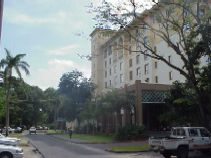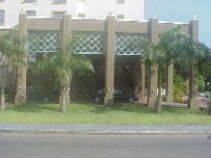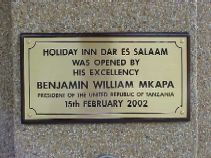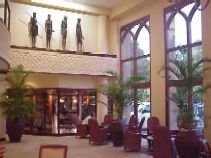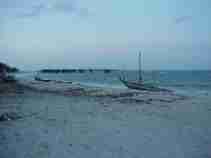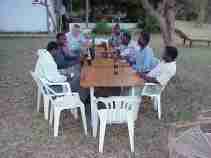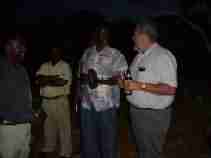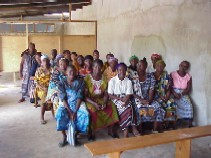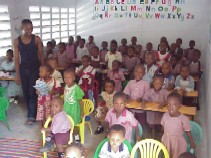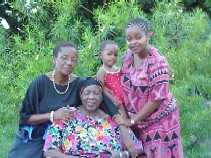Tuesday, February 26
Ich Bin Ein Ahakishaker!
|
|
| Learn Swahili! |
hello
welcome
thank you |
jambo
karibu
asante |
I await my morning bucket, which should be heralded by a knock on my bedroom door. At 7:45, still in my pajamas, I peek outside. Here, bucket, bucket! I hear Paul splashing inside the nearby "shower" room. He has my bucket.
Paul emerges, and the attendant goes off to get me a fresh bucket. I go into the "shower" room, close the door, and battle grime armed only with a bucket of hot water and a bar of soap. I achieve a moral victory at best, dress, and take a seat at the breakfast table. After some tea, fruit, and toast, it's time to load our belongings into the truck and begin the final leg of our journey to Ahakishaka.
The roads continue to deteriorate as we approach Ahakishaka. The ride is rough, and we're all bounced around inside the truck. As we approach the central village, we pass along a stretch of road that's been greatly improved since Paul's visit a few months ago. Paul tells me that back then it was strewn with boulders, some weighing hundreds of pounds, but today we can see where those boulders have been dug out and dragged aside to make a mostly clear, albeit still quite rough, path. It's an amazing feat that was accomplished without benefit of machinery or explosives.
"Ahakishaka" refers both to a region in western Tanzania that encompasses five distinct villages and to the central village in the region. Our arrival in this central village is a major event. The villagers have been expecting us, but they were expecting us tomorrow. There's plenty of construction underway: five new huts, one for each of the region's villages to display their handicrafts and produce. The huts are each lit with a single high-efficiency lightbulb connected to a long cable strung from the solar panel atop a special VIP hut being prepared especially for us.
A photographer with a video camera joins us and begins recording all of our activities. We're warmly greeted by local dignitaries and shown into one of the village huts. As we're introduced to even more people and shown the handicrafts inside, the hubbub outside continues as the villagers rush to finish the preparations they'd been making for our arrival. Women pass by carrying our mattresses, a luxury item in this part of the world, and others rush by with armloads of thatching material for roofs and reeds for walls.
Accompanied by the photographer, we're taken on a tour of the village. We hear "jambo" and "karibu" hundreds of times, and we reply "asante" at every opportunity. Paul has taken this tour before, and he's looking forward to sampling the banana beer and liquor again. I decline politely, explaining that I'd prefer not to drink any alcohol, but someone calls my bluff and offers me a freshly squeezed glass of unfermented banana juice. I amuse the onlookers (our every move draws a crowd) by toasting in Russian, "na zdroviye," and downing it quickly.
Our quarters are finally ready, and we're taken over to what Paul and Stan call the "campsite," a complex that includes our sleeping hut as well as a dining hut and a private latrine. The sleeping hut's walls are made of mud spread over a reed frame; the floor is dirt covered with a thick layer of straw. The mud comes from a nearby anthill, now reduced to a large hole in the ground. Ant saliva is a natural cement that holds the mud firmly to the frame. Because Paul advised them of my size and weight, the villagers have built a long and particularly sturdy bed for me; Paul has a similar bed, but not quite so large or well reinforced. We both have private bedrooms separated by reed curtains from the main room, where a mattress has been placed on the straw floor for Stan. Just outside the front door is thatched cubicle where one person at a time can stand and wash in privacy; our private latrine is a quarter-mile downhill.
We unpack. My room lacks a suitable armoire, so my unpacking is limited to laying out my critical supplies where I can find them in the dark: my flashlight and chemical lightsticks. Yes, our hut has a lightbulb; no, I'm not going to depend on it, especially if I need to visit the latrine at midnight. I also unpack the equipment that I brought for the Solar Village Institute: a computer, printer, camera, and laminator. The computer, printer, and camera are battery powered and can be recharged from the solar panel; the laminator is a hand-cranked model that uses cold adhesive and requires no electricity at all. Paul wants SVI to issue membership cards, and he's told me to be prepared to make about 25. I have supplies for more than 200 cards, so we'll have plenty of material for practice as I train SVI staff.
I suggest that we begin the training, but the villagers are still in the middle of introductions and giving us the tour of the campsite. After that, there's a short musical presentation to welcome us to Ahakishaka. It's all in Swahili, of which I only know a few words, but Stan tells us the general message is "welcome, we're glad you're here." One of the villagers presents the singers with a small donation, much as passers-by give to public performers in American cities, so Paul and I donate a few shillings as well. Paul struts in time to the music as he presents his donation, and I do the same; both of us get the crowd's raucous approval.
Dinner is served, and we sit down to a feast of local plants and animals. The plants range from the comfortably familiar (potatoes, carrots, rice) to the invitingly different (papaya, baked bananas). The animals range from the unadventurous (some kind of bird) to the, um, what part of what beast did this come from? Nonbird meat tends to come with lots of gravy. Gravy on rice and potatoes is good.
After dinner, I get a chance to start training some SVI staff on the equipment that I brought. The primary person I have to train, Aristedes, has a fair knowledge of Windows, so the lesson proceeds smoothly. I rely on Aristedes to share his Windows knowledge with my other two students, Jacqueline and Evelyn, after I'm gone. What I'm teaching is rather specialized and complicated, so while the three of them learn quickly, the lesson drags on past sunset. We run out of light just as we're getting to the part where we take pictures and make photo-ID membership cards. The printer also develops a minor glitch that prevents us from printing the few photos that we've managed to take, so I decide to carry all the equipment back to my hut and figure out the problem before continuing the lesson.
When I return to the campsite after dark, I find that a television has been set up just outside our sleeping hut. It's powered by the large truck battery that's been charging all day from the solar panel. The villagers have gathered to watch the videos of us taken by the photographer. To be blunt, it's pretty boring stuff: long stretches of unedited tape showing Paul and me walking around the village or - worse yet - standing around the village looking at things. Paul watches with them, but I'm tired and go to bed. Even though the television is just outside my bedroom wall, where the villagers clap and cheer whenever something interesting happens on the tape (which isn't terribly often), I'm soon asleep.
|
